LingQuery
Welcome to LingQuery, the show that asks - and attempts to answer - questions related to the language and communication sciences. Every episode, we respond in tandem with guests from a wide variety of disciplines to an audience-submitted question or “LingQuery”, all about human communication and its array of interrelated systems and modalities. Uncovering fascinating insights and perspectives you won’t hear anywhere else, this series explores the nature of phenomena such as speech, language, and cognition from the perspectives of biology, psychology, anthropology, art, and more. LingQuery, listen wherever you get your pods. Got a burning question about the language & communication sciences that you’d like to see featured on the show? Record an audio “LingQuery” and DM it to @lingquery_pod on Instagram OR email us at lingquery.pod@gmail.com Produced by LittleFire. Directed & edited by Raz Cunningham Co-written & co-hosted by Aidan Laliberte & Emily Tuohey
Episodes
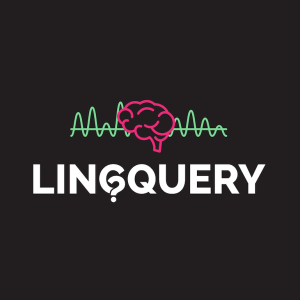
Friday May 02, 2025
Friday May 02, 2025
It's our very first BONUS episode! We’re doing something a little different. Join speech pathology graduate students Aidan, Kate, & Allison in a series of illuminating interviews with 4 of the caregivers featured in the book Caring For a Loved One with Aphasia After Stroke: A Narrative-Based Support Guide for Caregivers, Families and Friends.
This audio documentary explores what it means to care for a loved one after a seismic disruption to their lives, language, and sense of self.
Find out more about the book at the center of today’s episode HERE. The book is available online through several retailers, including Amazon, Barnes and Noble, and on the publisher’s website, Springer Nature. All proceeds of the book’s sale are donated to the Aphasia Programming Fund via the UConn Foundation to directly support rehabilitative and life participation efforts of people with aphasia as well as their families.
A HUGE thank you to our guests Noreen, Deb, Gail, and Pat for sharing your stories with us today.
Do YOU have a burning question about the language & communication sciences that you’d like to see featured on the show? Record your own audio “LingQuery” and DM it to @lingquery_pod on IG.

Friday Apr 11, 2025
Friday Apr 11, 2025
Finding out that a loved one is “comatose”, or in a minimally conscious/vegetative state is devastating. In far too many cases, families are told their loved one will never be aware of anything, never mind use language or communicate, again. Many caregivers are pushed to “pull the plug” way too soon. But despite a shocking misdiagnosis rate, many patients do end up regaining at least some level of consciousness, and, through specialized rehab, can maximize their recovery and tap into various means of communication.
In this episode, Aidan talks with neuropsychologist Dr. Katherine O’Brien and speech-language pathologist Carissa Skarke, two professionals who specialize in disorders of consciousness (DoC) rehabilitation. Together, they discuss the complexities of assessing and providing modes of communication for patients and families often pushed aside by the broader healthcare system. To find out more, check out their DoC program at TIRR Memorial Hermann.
A HUGE thank you to listener Lindsey for submitting today’s LingQuery!
Do YOU have a burning question about the language & communication sciences that you’d like to see featured on the show? Record your own audio “LingQuery” and DM it to @lingquery_pod on IG.

Friday Apr 11, 2025
Friday Apr 11, 2025
*DISCLAIMER* Since recording this episode, a lot has changed in the U.S. and around the world. If you've been paying attention, you know that new federal policies continue to threaten the rights of transgender and gender-diverse people—including access to gender-affirming healthcare through insurance coverage. For more information on how you can push back against these inhumane attempts to deny basic healthcare, our guest Anne has compiled some amazing resources. Visit https://www.trueselfspeech.com/slpfreebie and check out the accompanying newsletter for affirming SLPs at https://true-self-speech-therapy.kit.com/a43a51b242.
Have you ever heard a recording of your own voice and thought, “Wait a minute, I sound like THAT?!” We often don’t sound the way we think we do. And when we’re confronted with this perceived mismatch, it can feel pretty… well, weird. Our voice and sense of identity are closely linked, but why is that, exactly? For many gender diverse and transgender individuals, it can be a struggle to find their voice, which can have long term consequences for how they perceive themselves and how they’re perceived by others. Through professional mediation, one’s voice can be shaped to better fit one’s identity, which for many is a key step in the gender affirming process.
In this dynamic episode, Aidan & Emily talk with two guests, speech-language pathologist (SLP) Anne Quirk and one of her clients, Harper, to discuss all things related to gender-affirming voice therapy, a growing and fascinating area of care for SLPs and related professionals. Learn more about Anne’s private practice and the services she provides at www.trueselfspeech.com.
A HUGE thank you to listener Kate for submitting today’s LingQuery!
Do YOU have a burning question about the language & communication sciences that you’d like to see featured on the show? Record your own audio “LingQuery” and DM it to @lingquery_pod on IG.

Friday Apr 11, 2025
Friday Apr 11, 2025
Injuries are no fun. A stubbed toe or a skinned knee are painful, sure, but they’re hardly life-altering. Clearly, not all wounds are created equal. It’s no surprise that trauma to the brain, in any form, can drastically (and permanently) alter someone’s life in myriad ways. But what exactly are the long-term consequences of brain injury? Importantly, how does brain injury reshape communication and behavior? If you or a loved one has had a brain injury, where can you go for resources?
In this episode, Aidan & Emily talk with Certified Brain Injury Specialist (CBIS) Victor Darr about the unique challenges associated with brain injury, with a special focus on how it can impact one’s sense of self and ability to connect with others. Learn more about the crucial support and resources his organization - Brain Injury Alliance of Connecticut (BIACT) - provides to those who need it most at www.biact.org.
A HUGE thank you to listener Brittany for submitting today’s LingQuery!
Do YOU have a burning question about the language & communication sciences that you’d like to see featured on the show? Record your own audio “LingQuery” and DM it to @lingquery_pod on IG.

Friday Apr 11, 2025
Friday Apr 11, 2025
At any moment, a stroke or brain injury can leave aphasia in its wake, a language disorder that can impact all facets of someone’s life. But aphasia has ripple effects that move well beyond the individual. Learning to live with aphasia is something caregivers have to do too, and navigating this major life change is a daunting task, to say the least. Mounting research is clear that integrating caregivers in the rehabilitative process is not only helpful - it’s key to improving treatment outcomes.
In this episode, Aidan chats with Dr. Jennifer Mozeiko, speech pathologist and director of University of Connecticut’s Aphasia Rehab Lab, for a clinician’s perspective into the essential role that families and caregivers play in their loved one’s recovery and long-term aphasia care. Learn more about the book she co-edited, Caring For a Loved One with Aphasia After Stroke (2022), HERE. Check out our social media for the many resources discussed throughout the episode!
A HUGE thank you to listener Emily for submitting today’s LingQuery!
Do YOU have a burning question about the language & communication sciences that you’d like to see featured on the show? Record your own audio “LingQuery” and DM it to @lingquery_pod on IG.
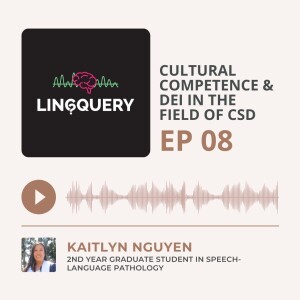
Wednesday Jul 17, 2024
Wednesday Jul 17, 2024
Cultural competence in the field of communication sciences & disorders (CSD) is an essential topic, especially when so many CSD professionals in the United States continue to be white and female. How can clinicians navigate an increasingly diverse client base if they lack key cultural perspectives and awareness? And how can clients who identify as racial and/or ethnic minorities be expected to connect with SLPs and AuDs who simply don’t understand their lived experiences? What does this all mean for quality of care not just in the field of CSD, but the US healthcare system at large?
In this episode, Emily & Aidan chat with second year SLP student Katie Nguyen about her experience in grad school as a BIPOC individual, unpack the complicated barriers that face many minority student clinicians, and outline her biggest hopes for the future of cultural diversity in CSD.
A HUGE thank you to listener Madelyn for submitting today’s LingQuery!
Do YOU have a burning question about the language & communication sciences that you’d like to see featured on the show? Record your own audio “LingQuery” and DM it to @lingquery_pod on IG.
Hello, hello! Welcome to LingQuery, the show that asks - and attempts to answer - questions related to the language and communication sciences. Every episode, we respond in tandem with guests from a wide variety of disciplines to an audience-submitted question or “LingQuery”, all about human communication and its array of interrelated systems and modalities. Uncovering fascinating insights and perspectives you won’t hear anywhere else, this series explores the nature of phenomena such as speech, language, and cognition from the perspectives of biology, psychology, anthropology, art, and more. LingQuery, listen wherever you get your pods.
Produced by LittleFire.
Directed & edited by Raz Cunningham
Co-written & co-hosted by Aidan Laliberte & Emily Tuohey
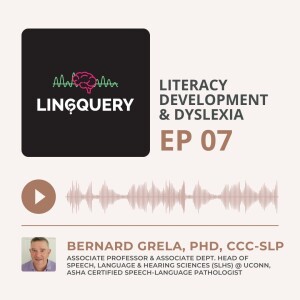
Wednesday Jul 17, 2024
Wednesday Jul 17, 2024
If you’re reading this sentence with ease, consider yourself privileged. Why? Language development is a complex cognitive process that involves distinct, yet overlapping, domains. Most of it develops relatively effortlessly and without instruction. But there’s a crucial component that needs to be explicitly taught, and it's one that most of us take for granted - literacy. It’s no secret that reading and writing are among the most essential skills for success in the modern world, and the implications of falling behind in these abilities extend well beyond the classroom.
In this episode, Aidan & Emily chat with Dr. Bernard Grela about all things literacy - how it develops, how it's taught, and what happens when it’s compromised, especially in the case of dyslexia, a language disorder marked by a cluster of distinct symptoms.
A HUGE thank you to listener Mo for submitting today’s LingQuery!
Do YOU have a burning question about the language & communication sciences that you’d like to see featured on the show? Record your own audio “LingQuery” and DM it to @lingquery_pod on IG.
Welcome to LingQuery, the show that asks - and attempts to answer - questions related to the language and communication sciences. Every episode, we respond in tandem with guests from a wide variety of disciplines to an audience-submitted question or “LingQuery”, all about human communication and its array of interrelated systems and modalities. Uncovering fascinating insights and perspectives you won’t hear anywhere else, this series explores the nature of phenomena such as speech, language, and cognition from the perspectives of biology, psychology, anthropology, art, and more. LingQuery, listen wherever you get your pods.
Produced by LittleFire.
Directed & edited by Raz Cunningham
Co-written & co-hosted by Aidan Laliberte & Emily Tuohey
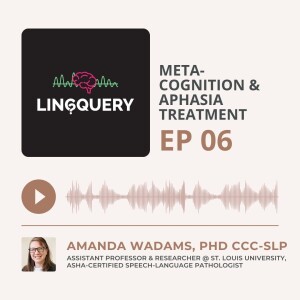
Wednesday Jul 17, 2024
Wednesday Jul 17, 2024
Think about your thinking for a moment. No seriously. Are you doing it? Now think some more. Is your inner monologue composed of actual words or is it simply a stream of images or impressions? What would it be like to “think” without language anyway?
In this episode, Aidan & Emily are joined by Dr. Amanda Wadams of St. Louis University to talk about the intertwined, yet distinct domains of human cognition and language, and how they’re relevant to individuals with aphasia, a communication disorder that often emerges after stroke or TBI. In this illuminating interview, Dr. Wadams discusses her research investigating the role of therapy that targets both meta-cognitive (the ability to think about one’s own thinking) and linguistic skills concurrently. In building clients’ self-awareness of their unique communicative strengths and weaknesses, treatment outcomes for aphasia may be vastly improved. But, navigating the layered dimensions of language, thought, and attention is NO easy task.
A HUGE thank you to listener Emmy for submitting today’s LingQuery!
Do YOU have a burning question about the language & communication sciences that you’d like to see featured on the show? Record your own audio “LingQuery” and DM it to @lingquery_pod on IG.
Welcome to LingQuery, the show that asks - and attempts to answer - questions related to the language and communication sciences. Every episode, we respond in tandem with guests from a wide variety of disciplines to an audience-submitted question or “LingQuery”, all about human communication and its array of interrelated systems and modalities. Uncovering fascinating insights and perspectives you won’t hear anywhere else, this series explores the nature of phenomena such as speech, language, and cognition from the perspectives of biology, psychology, anthropology, art, and more. LingQuery, listen wherever you get your pods.
Produced by LittleFire.
Directed & edited by Raz Cunningham
Co-written & co-hosted by Aidan Laliberte & Emily Tuohey
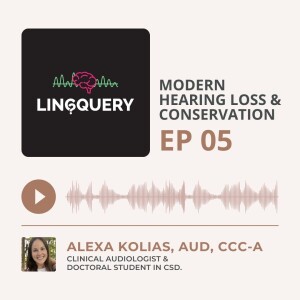
Wednesday Jul 17, 2024
Wednesday Jul 17, 2024
Can you repeat that? We didn’t quite catch- what?! WHAT?!?
For many of us, hearing is an essential component of language & communication. Unfortunately, the research is in, and the modern world is louder than ever. From industrial noise pollution, to jam-packed crowded cities to personal devices that deliver sound straight to our eardrums, protecting our hearing has never been more important. And no, we’re not just talking about our grandparents’ hearing. Modern developments have made it so that today’s young people are at an increased risk of losing their hearing, and at a faster rate than previous generations.
In this episode, Emily & Aidan are joined by audiologist and University of Connecticut doctoral student Alexa Kolias to discuss how to (safely) navigate a noisy and chaotic auditory world.
A HUGE thank you to listener Nicole for submitting today’s LingQuery!
Do YOU have a burning question about the language & communication sciences that you’d like to see featured on the show? Record your own audio “LingQuery” and DM it to @lingquery_pod on IG.
Welcome to LingQuery, the show that asks - and attempts to answer - questions related to the language and communication sciences. Every episode, we respond in tandem with guests from a wide variety of disciplines to an audience-submitted question or “LingQuery”, all about human communication and its array of interrelated systems and modalities. Uncovering fascinating insights and perspectives you won’t hear anywhere else, this series explores the nature of phenomena such as speech, language, and cognition from the perspectives of biology, psychology, anthropology, art, and more. LingQuery, listen wherever you get your pods.
Produced by LittleFire.
Directed & edited by Raz Cunningham
Co-written & co-hosted by Aidan Laliberte & Emily Tuohey
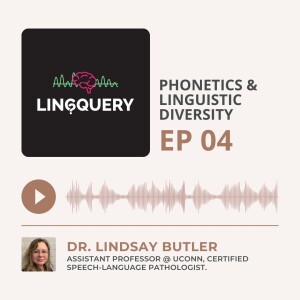
Saturday Mar 02, 2024
Saturday Mar 02, 2024
Have you ever moved to a new town, city, or even country and were struck at how different everyone else sounds? Sure, there are some 7000 languages around the globe, but why do they sound so different from each other? Emily & Aidan are joined by speech-language pathologist and linguistics researcher Dr. Lindsay Butler to unpack the wonderful world of phonetics and explore the powerful link between language and identity. Shoutout to listener Cammie for submitting today’s LingQuery!
Got a burning question about the language & communication sciences that you’d like to see featured on the show? Record an audio “LingQuery” and DM it to @lingquery_pod on Instagram OR email us at lingquery.pod@gmail.com





